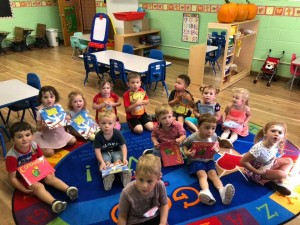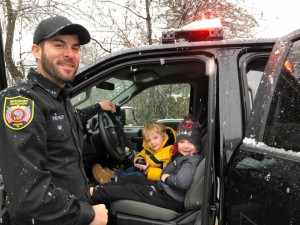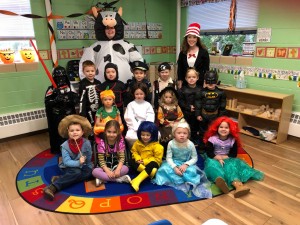 In 2018, Bessemer Presbyterian Church in the Presbytery of Shenango was awarded an Innovation Grant by the Synod of the Trinity. In two years, the church has used those funds to establish a preschool in its community that has experienced success and continued viability of this ministry endeavor, even through COVID-19. Below is a review by the Rev. Nathan R. Leslie of how the grant funds have been used thus far. (For more on the Synod’s Innovation Grant, click here.)
In 2018, Bessemer Presbyterian Church in the Presbytery of Shenango was awarded an Innovation Grant by the Synod of the Trinity. In two years, the church has used those funds to establish a preschool in its community that has experienced success and continued viability of this ministry endeavor, even through COVID-19. Below is a review by the Rev. Nathan R. Leslie of how the grant funds have been used thus far. (For more on the Synod’s Innovation Grant, click here.)
Bessemer Presbyterian Preschool was established in the spring of 2018 for the Bessemer-Mohawk community for children ages 3-5 as a faith-based preschool program, which will provide critical early learning skills and connections with vital early childhood educational resources. The mission is to provide a quality preschool program with developmentally-appropriate learning experiences and connections to early learning resources in the context of a nurturing Christian environment.
We selected two of the Synod’s ends we hoped to meet: “Fostering conversation and action for the promotion of social righteousness” and “Providing services of education and nurture for member presbyteries.”
Given the socioeconomic demographics of the community surrounding Bessemer Presbyterian Church, there is a need for an enriching educational experience that is affordable, safe and nurturing to all children. We were able to do this not only by keeping the costs affordable, but with the help of two or three very generous donors who covered scholarships for students whose families met financial hardships during the year. We also had several donors who wished to specifically support individual families in financial need who were not affiliated with a church. This happened not only in the 2018-19 school year, but also during 2019-20.
Additionally, we hoped to provide connections to free and helpful resources that would benefit the overall growth of the child (for example, speech screenings, vision and dental screenings, developmental screenings, interaction with the local library, etc.). We were able to accomplish most all of the above.
Screenings for vision led to referrals for several children to their family eye-care professional, who in turn prescribed glasses for the children. Parents were greatly appreciative for this resource, as they might not have been otherwise aware of this need until much later in their child’s life. Through the “Ages and Stages” Questionnaire Screening completed for each child, we were able to connect children with various resources through the local Intermediate Unit IV, which included connecting children with speech therapists, as well as the potential for IEP’s, which would help the children as they transition to kindergarten.
The children were also given dental screenings, which are also required for kindergarten registration, not only to detect any issues but also to prepare them for the next step of their education. Our local librarian comes in once a month to read a story and do an activity with the children. Additionally, she brings several books from the library to the classroom that the children can read during centers each day. Lastly, we had local police officers and firefighters visit the classes, teaching the children about various safety-related matters and giving the children a chance to touch/sit in their vehicles.
 We established several main goals at the start and have been able to meet them. The first was to educate up to 30 children annually between two classes that meet throughout the week. We were able to almost completely fill both classes, with 29 of a potential 30 being enrolled during both our first and now second years. In the 2019-20 school year, we met capacity in both classes and had two students on a wait list for the 4/5 class at the beginning of the year as we had met capacity. In the end, we once again educated 30 children.
We established several main goals at the start and have been able to meet them. The first was to educate up to 30 children annually between two classes that meet throughout the week. We were able to almost completely fill both classes, with 29 of a potential 30 being enrolled during both our first and now second years. In the 2019-20 school year, we met capacity in both classes and had two students on a wait list for the 4/5 class at the beginning of the year as we had met capacity. In the end, we once again educated 30 children.
Secondly, we intended that the children will be prepared for kindergarten by gaining a basic knowledge of their alphabet, numbers, colors, shapes, self-help skills (tying shoes, using restroom and wash facilities, etc.), appreciation for books and music, proper peer-to-peer and child-to-adult interactions, and the like. We also hoped to foster this in a Christian environment. We used a play-based curriculum that allows children to explore these concepts through monthly themes. Each morning the children have different centers with activities related to these themes targeting various kindergarten-readiness skills. We are not entirely overt in our inclusion of faith-elements but integrate them where appropriate (Bible stories at various holidays, prayer at snack-times, etc.).
We also built an appreciation for books by way of a mission project through our congregation and community, where individuals could donate money to buy a $1 per month book for each child from Scholastic Books. Each month, the children were so excited to take home a new book to share with their families. In the end, not only were the children very ready for kindergarten, but they had a well-rounded preschool experience.
We hoped to maintain one teacher 30 hours/week, and one aide 15 hours/week, sustainable through child tuition. Our previous congregation member who was a part of this plan took another job and could not continue her work with us. We were blessed to hire another young woman with a teaching degree from a neighboring church who has been an extremely valuable asset to the success of our program.
Finally, we hoped to keep our tuition affordable, comparable with secular and other private preschools in the surrounding area. We’ve maintained our tuition at an affordable rate, been able to keep up with our financial obligations and finished the last two years financially solvent.
 Our teachers and our preschool board continue to devise ways to further our ability to meet the goals set about in the inception of this program. We have discussed the possibility of adding additional afternoon classes for our current age groups, as well as a possible class for 2- and 3-year-old children (like a MOPS program) a few times a month where a parent can come in and participate in classes with their children. As our facilities and finances allow, we will prayerfully pursue these options.
Our teachers and our preschool board continue to devise ways to further our ability to meet the goals set about in the inception of this program. We have discussed the possibility of adding additional afternoon classes for our current age groups, as well as a possible class for 2- and 3-year-old children (like a MOPS program) a few times a month where a parent can come in and participate in classes with their children. As our facilities and finances allow, we will prayerfully pursue these options.
Addendum (re: COVID-19): After the state closures began, the preschool was closed from March 13 through the end of the 2019-20 school year. Our teachers continued to maintain contact with their children. They drove around little care packages for each student. Additionally, they had a story time, song and activity that they did via Zoom conference videos each morning until the end of the year. Nearly all the children continued to participate regularly and loved it. The parents were also extremely appreciative.
Financially, while the parents did not pay tuition for missed months of school, many chose to donate back one month’s tuition as a donation. Finally, while we had a graduation ceremony for the 4/5 class last spring in the sanctuary, we have not yet had one this year because of COVID-19. We do plan to have something this summer as CDC guidelines, state/local government and session directives permit.
In the end, it’s very clear after two years of operation, our preschool is beloved not only by the children, but their parents, families and our community. Truly, the Lord has used this endeavor to bless many lives. Thank you to the Synod of the Trinity for your generous assistance in this important ministry!!
